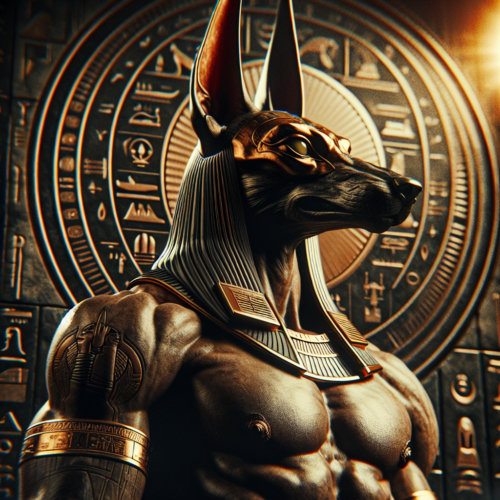Anubis, the enigmatic deity of ancient Egypt, stands as a sentinel at the threshold between life and death. He is ususally depicted as a muscular man with the head of a black jackal. His ears are alert, ever attentive to the whispers of the spirits that meander through the necropolis, and his eyes, sharp and discerning, miss nothing in the shadowy realm he oversees.
Anubis’ parentage is shrouded in myth, with some tales naming Osiris and Nephthys as his parents, while others whisper of the sun god Ra or even the war god Seth. Regardless of his origins, Anubis’ role is clear: he is the guardian of the dead, the conductor of souls, and the vigilant overseer of the embalming process. His presence is invoked in funerary rites and his protection sought to ward off evil and ensure the safe journey of the deceased through the perilous underworld.

Guide of souls
Anubis is often depicted holding the ankh, the key of life, in one hand, and the scepter, a symbol of authority, in the other. These emblems affirm his dominion over the afterlife and his role as a protector and guide of souls. He is the ultimate arbiter of fate in the Hall of Two Truths, where the hearts of the deceased are weighed against the feather of Ma’at, the goddess of truth and justice. Should the scales tip in favor of the heart, the soul is granted passage to the afterlife; if not, it is devoured by Ammit, the soul-eater, and ceases to exist.
In art, Anubis is a commanding presence, his statues and paintings adorning tombs and temples, a silent guardian warding off grave robbers and guiding the pharaohs in their journey to the afterlife. His cult center was Cynopolis, the city of dogs, where he was worshipped with fervor, and his priests donned wooden masks bearing his likeness during sacred rituals.
Anubis’s influence extends beyond the ancient world, his iconic image enduring through the ages. In modern times, he is still recognized as the most emblematic of the Egyptian gods, a figure that captivates the imagination and reminds us of the ancient Egyptians’ profound connection with the afterlife. His legacy is a testament to the timeless human quest to understand the mysteries of life, death, and what lies beyond.
Appearances in modern culture
Books
- Anubis Speaks!: A Guide to the Afterlife by the Egyptian God of the Dead <– yes, for kids
- Anubis: The History and Legacy of the Ancient Egyptian God of the Afterlife
- Children of Anubis (Supernatural Novel #17) by Tim Waggoner <– a Sam & Dean classic
- The Complete Gods and Goddesses of Ancient Egypt
- The Egyptian Book of the Dead: The Complete Papyrus of Ani : The Complete Papyrus of Ani
Movies and series
Video games
- Age of Mythology (2002)
- Assassin’s creed: Origins (2017)
- SMITE (2015)
- SMITE 2 (2024)
